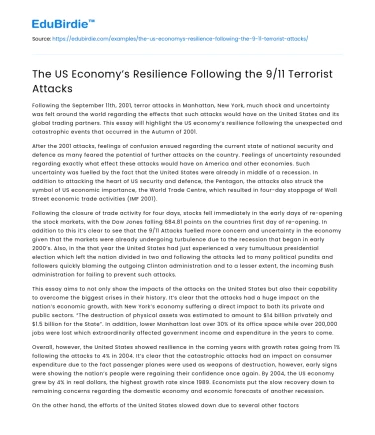Following the September 11th, 2001, terror attacks in Manhattan, New York, much shock and uncertainty was felt around the world regarding the effects that such attacks would have on the United States and its global trading partners. This essay will highlight the US economy’s resilience following the unexpected and catastrophic events that occurred in the Autumn of 2001.
After the 2001 attacks, feelings of confusion ensued regarding the current state of national security and defence as many feared the potential of further attacks on the country. Feelings of uncertainty resounded regarding exactly what effect these attacks would have on America and other economies. Such uncertainty was fuelled by the fact that the United States were already in middle of a recession. In addition to attacking the heart of US security and defence, the Pentagon, the attacks also struck the symbol of US economic importance, the World Trade Centre, which resulted in four-day stoppage of Wall Street economic trade activities (IMF 2001).
Save your time!
We can take care of your essay
- Proper editing and formatting
- Free revision, title page, and bibliography
- Flexible prices and money-back guarantee
Following the closure of trade activity for four days, stocks fell immediately in the early days of re-opening the stock markets, with the Dow Jones falling 684.81 points on the countries first day of re-opening. In addition to this it’s clear to see that the 9/11 Attacks fuelled more concern and uncertainty in the economy given that the markets were already undergoing turbulence due to the recession that began in early 2000’s. Also, in the that year the United States had just experienced a very tumultuous presidential election which left the nation divided in two and following the attacks led to many political pundits and followers quickly blaming the outgoing Clinton administration and to a lesser extent, the incoming Bush administration for failing to prevent such attacks.
This essay aims to not only show the impacts of the attacks on the United States but also their capability to overcome the biggest crises in their history. It’s clear that the attacks had a huge impact on the nation’s economic growth, with New York’s economy suffering a direct impact to both its private and public sectors. “The destruction of physical assets was estimated to amount to $14 billion privately and $1.5 billion for the State”. In addition, lower Manhattan lost over 30% of its office space while over 200,000 jobs were lost which extraordinarily affected government income and expenditure in the years to come.
Overall, however, the United States showed resilience in the coming years with growth rates going from 1% following the attacks to 4% in 2004. It’s clear that the catastrophic attacks had an impact on consumer expenditure due to the fact passenger planes were used as weapons of destruction, however, early signs were showing the nation’s people were regaining their confidence once again. By 2004, the US economy grew by 4% in real dollars, the highest growth rate since 1989. Economists put the slow recovery down to remaining concerns regarding the domestic economy and economic forecasts of another recession.
On the other hand, the efforts of the United States slowed down due to several other factors including concerns over the falling dollar, an unstable housing market and rising oil prices. In essence, while it may be a lot simpler to attribute the increase in oil prices to the Iraq war which came about in response to the 9/11 attacks, and the general assumption that Iraq had something to do with the attacks, experts believe that military action and intervention alone does not explain the rise in oil prices, it is in fact driven by economic instability and uncertainty in the housing market. In addition to this economic stability came a huge impact on foreign direct investment in the United States. With the fear of another attack looming, multinationals operated with an eye of caution when investing in America. 2000 saw a healthy 31.5% investment rate, however, after the attacks it fell to -01.25% (US Department of Commerce 2008). Subsequently, however, by 2003, foreign investments were back on the rise with investors adopting more of a “wait and see how the United States responds” attitude than that of a lack of confidence in the US markets.
The impact of the 9/11 Attacks on US fiscal policy and budgetary resources. In the wake of the attacks it was no surprise that the United States would retaliate, and action would be launched in Afghanistan in hope of catching those responsible, Osama Bin-Laden and his Al-Qaeda group. US military action was launched on October 7, 2001, however by 2003, the nation quickly found themselves fighting two wars since bringing their “War on Terror” initiative into Iraq. Both wars were funded through federal government borrowing rather than an increase in taxes. It’s clear that engaging in both wars simultaneously has resulted in huge budgetary expenditures. The “War on Terror” policy went from $301,697 billion in 2000 to $546,018 billion in 2006 (Military Expenditure Database). In addition to an increase in military expenditures following 9/11, there was a significant increase in spending to support the mission of protecting the US borders and providing a nationwide security network through the creation of Homeland Security (9/11 Commission Report).
In summary, the United States ability to continue to persevere in the wake of the crises showed much resilience. It’s fair to say that 9/11 played little direct effect on weakening the economy given the fact that the United States was already in a recession before the attacks occurred. If anything, this catastrophe brought more awareness and heightened regulations to ensure that such events could be reduced and prevented in the years to come.






 Stuck on your essay?
Stuck on your essay?

